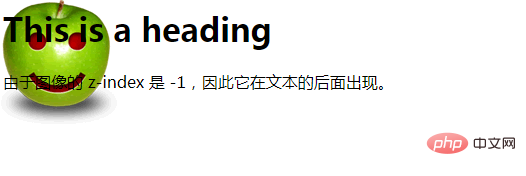What is the z-index attribute?
The z-index attribute is an attribute used in CSS to set the stacking order of elements. Elements with a higher stacking order will always be in front of elements with a lower stacking order, and elements can have negative The z-index attribute value.

The operating environment of this article: Windows 7 system, Dell G3 computer, css3 version.
z-index attribute sets the stacking order of elements. Elements with a higher stacking order will always appear in front of elements with a lower stacking order.
Note: Elements can have negative z-index attribute values.
Note: Z-index only works on positioned elements (such as position:absolute;)!
Description
This property sets the position of a positioned element along the z-axis, which is defined as the axis that extends vertically to the display area. If it is a positive number, it is closer to the user, and if it is a negative number, it is further away from the user.
Default value: auto
Inheritance: no
Version: CSS2
JavaScript Syntax: object.style.zIndex="1"
Possible values
auto Default. The stacking order is equal to the parent element.
number Set the stacking order of elements.
inherit specifies that the value of the z-index attribute should be inherited from the parent element.
[Recommended learning: css video tutorial]
Example
Set the z-index of the image:
<html>
<head>
<style type="text/css">
img
{
position:absolute;
left:0px;
top:0px;
z-index:-1;
}
</style>
</head>
<body>
<h1 id="This-nbsp-is-nbsp-a-nbsp-heading">This is a heading</h1>
<img src="/static/imghw/default1.png" data-src="/i/eg_smile.gif" class="lazy" / alt="What is the z-index attribute?" >
<p>由于图像的 z-index 是 -1,因此它在文本的后面出现。</p>
</body>
</html>Effect:

The above is the detailed content of What is the z-index attribute?. For more information, please follow other related articles on the PHP Chinese website!

Hot AI Tools

Undresser.AI Undress
AI-powered app for creating realistic nude photos

AI Clothes Remover
Online AI tool for removing clothes from photos.

Undress AI Tool
Undress images for free

Clothoff.io
AI clothes remover

Video Face Swap
Swap faces in any video effortlessly with our completely free AI face swap tool!

Hot Article

Hot Tools

Notepad++7.3.1
Easy-to-use and free code editor

SublimeText3 Chinese version
Chinese version, very easy to use

Zend Studio 13.0.1
Powerful PHP integrated development environment

Dreamweaver CS6
Visual web development tools

SublimeText3 Mac version
God-level code editing software (SublimeText3)

Hot Topics
 1387
1387
 52
52
 Easy way: remove z-index attribute with jQuery
Feb 23, 2024 pm 05:18 PM
Easy way: remove z-index attribute with jQuery
Feb 23, 2024 pm 05:18 PM
Using jQuery to remove the z-index attribute is a very simple operation. The following will demonstrate how to achieve this operation through specific code examples. First, we need to introduce the jQuery library into HTML, you can use the following CDN link: &
 Interpretation of CSS cascading properties: z-index and position
Oct 20, 2023 pm 07:19 PM
Interpretation of CSS cascading properties: z-index and position
Oct 20, 2023 pm 07:19 PM
Interpretation of CSS cascading properties: z-index and position In CSS, the design of layout and style is very important. In design, it is often necessary to layer and position elements. Two important CSS properties, z-index and position, can help us achieve these needs. This article will dive into these two properties and provide specific code examples. 1. z-index attribute The z-index attribute is used to define the stacking order of elements in the vertical direction. Stacking of elements
 What does z-index mean in css?
Nov 20, 2020 pm 02:21 PM
What does z-index mean in css?
Nov 20, 2020 pm 02:21 PM
In CSS, z-index means "level, layer space stacking level". You can specify the stacking order of an element, which is used to confirm the stacking level of the element in the current stacking context. Elements with a higher stacking order will always be In front of elements lower in the stacking order; syntax "element {z-index:auto|<integer>}".
 HTML layout tips: How to use the z-index attribute for cascading element control
Oct 20, 2023 pm 05:50 PM
HTML layout tips: How to use the z-index attribute for cascading element control
Oct 20, 2023 pm 05:50 PM
HTML layout skills: How to use the z-index attribute to control cascading elements Introduction: In HTML and CSS, layout is an important part of web design. When implementing web page layout, we often encounter situations where elements need to be displayed in a cascading manner, such as a navigation bar floating at the top, a pop-up window popping up above other content, etc. This article will introduce how to use the z-index property of CSS to implement cascading control of elements and provide specific code examples. 1. What is the z-index attribute z-in
 HTML layout tips: How to use the z-index attribute to control the level of cascading elements
Oct 18, 2023 am 09:09 AM
HTML layout tips: How to use the z-index attribute to control the level of cascading elements
Oct 18, 2023 am 09:09 AM
HTML layout skills: How to use the z-index attribute to control the level of cascading elements. In web design and development, we often need to control the level of elements to achieve the desired layout effect. At this time, the z-index attribute is our good helper. The z-index attribute can control the stacking order of elements in the vertical direction, allowing us to easily adjust the display priority of elements. Let us learn how to use the z-index attribute to control the level of cascading elements through specific code examples.
 A deep dive into the z-index attribute and its common attribute values: Understanding absolute positioning
Dec 28, 2023 am 11:41 AM
A deep dive into the z-index attribute and its common attribute values: Understanding absolute positioning
Dec 28, 2023 am 11:41 AM
Understand the common attribute values of absolute positioning: In-depth analysis of the z-index attribute in CSS In CSS, absolute positioning (absolutepositioning) is a common positioning method used to accurately control the position of elements on the page. One of the important attribute values, z-index, can help us determine the overlapping order of elements in the vertical direction. In this article, we will analyze the z-index attribute in depth and give specific code examples to help readers better understand and use this
 Use jQuery to remove the z-index value of an element
Feb 23, 2024 pm 09:06 PM
Use jQuery to remove the z-index value of an element
Feb 23, 2024 pm 09:06 PM
Using jQuery to remove the z-index attribute of an element is a common operation, especially when you need to dynamically adjust the stacking order of elements. By removing the z-index attribute of an element, you can restore the element to its default stacking order so that it is no longer affected by z-index. The following will use a specific code example to demonstrate how to use jQuery to remove the z-index attribute of an element:
 Remove the z-index attribute of an element using jQuery
Feb 19, 2024 pm 11:05 PM
Remove the z-index attribute of an element using jQuery
Feb 19, 2024 pm 11:05 PM
When writing jQuery code, sometimes we need to remove the z-index value of an element. This may involve a variety of situations, such as dynamically modifying the element hierarchy, or setting the z-index to the default value under certain circumstances. In this article, we will introduce how to use jQuery to remove the z-index value of an element and give specific code examples. First, let’s understand what z-index does. The z-index attribute specifies an element in the stacking order




